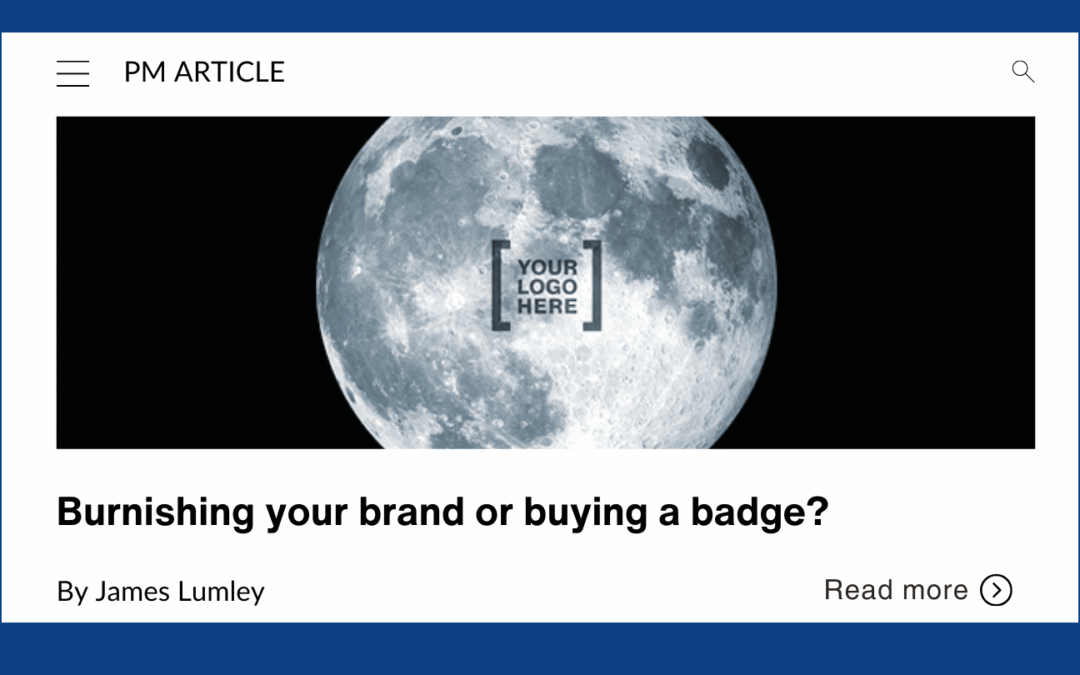From hot-air balloons to horticultural show gardens, professional services firms are rethinking what sponsorship can do. In an era of brand building, visibility and values, James Lumley explores how firms are activating partnerships that go beyond the logo.
For decades, sponsorships were seen as the domain of consumer brands with deep pockets and mass-market ambitions. Football shirts, Formula 1 cars, music festivals: a place for beer, banks and broadband, not boardrooms and balance sheets.
That changed earlier this year when the Liverpool-based law firm Hill Dickinson announced its sponsorship of Everton Football Club’s stadium in a deal thought to be worth millions.
And this begs a question: why shouldn’t professional services firms get involved in big-ticket sponsorship?
The truth is that, while it’s unlikely that a law firm will ever bankroll an F1 team, professional services firms have been sponsoring events for decades, and in recent years have been taking brand sponsorship increasingly seriously. And they aren’t just slapping their logos on billboards.
From the Chelsea Flower Show to county fairs, from jazz radio to legal poetry, firms are using sponsorships to shape brand identity, deepen relationships and communicate strategic intent. And they’re learning that the route to ROI runs not just through visibility but through values, activation, long-term commitment, and a true understanding of brand.
Why bother?
“Ultimately, law firms are businesses,” says Brian Macreadie, Head of Marketing at Addleshaw Goddard.
“We compete with others, and we embrace tactics that help us grow.”
The firm made headlines when it became headline sponsor of the RHS Chelsea Flower Show, a move Macreadie calls a “bold, confident brand statement”.
“Why Chelsea?” says Macreadie. “There are half a dozen different factors, and we explored many different possibilities. But Chelsea was by far our favourite. We’re dedicated to high-quality outcomes for our clients.
And Chelsea has that. It’s a very prestigious event. Firstly, the RHS is a charity dedicated to the environment, it has a Royal Charter, and we shared the same values of wanting to help people flourish and grow. And then of course the Chelsea Flower Show is televised on the BBC, is a simply stunning event, and is very, very popular amongst politicians and policy makers and senior executives, and CEOs and lawyers,” he said.
And, he adds, Chelsea starts the London summer season and has a strong association with the capital, making the sponsorship a strong statement that the international firm is headquartered in London and is part of London’s legal fabric.
Not every firm is operating on Addleshaw Goddard’s scale. For Birketts, a full-service firm with strong regional roots, the priority is local presence and personal connection.
“We go where our clients are,” says Adam Burden, a solicitor in the Agriculture and Estates team. That means sponsoring events like the Kent County Show and sports clubs like Ipswich Town Football Club. It might not cost the world to sponsor the farmers’ breakfast event at the County Show, but the return can be enormous. One client relationship born at the show is now on matter number 224.
And, says Burden, getting involved in country shows has been a tactic of the firm for as long as anyone can remember. In fact, the whole point of a country show is that it is a place for farmers to meet business people who serve the sector, be it land agents, seed merchants, accountants or lawyers.

At Mishcon de Reya, the model is different again.
Chief Brand Officer Elliot Moss isn’t chasing high-footfall events or logo space. “The partnerships that matter to us are where we can deliver something of value. That’s why we focus on content partnerships,” he says. With long-running collaborations with Jazz FM and the Economist, Mishcon is using media partnerships to reach audiences with storytelling that reflects the firm’s brand values and client base.
The firm, he said, wouldn’t reject out of hand the idea of becoming headline sponsor to an event, but would need convincing.
“There is,” he says, “a place for that sort of sponsorship if you are super-clear about who you are talking to and what your objective is. And there needs to be longevity. You can’t just stick around for five minutes.”
How to use them
What distinguishes today’s professional services sponsorships from their logo-driven predecessors is the way they are activated.
At Addleshaw Goddard, the Chelsea Flower Show isn’t just a week in May – it’s a year-round programme. Show gardens are relocated to community organisations after the show: a youth homelessness centre in Edinburgh one year, a carers’ respite centre the next, and a school for children with autism planned for the future. Addleshaw Goddard staff volunteer with the RHS, sending out seed packs to aspiring gardeners and supporting fundraising campaigns. It’s a long-term, hands-dirty commitment.
“The RHS vetted us as much as we vetted them,” says Macreadie. “They weren’t looking for a cheque. They wanted a partner.”
Mishcon de Reya’s content partnerships offer a different form of activation. Jazz Shapers, the firm’s long-running programme on Jazz FM, profiles founders and entrepreneurs, reinforcing Mishcon de Reya’s positioning as a firm that understands creative, ambitious businesses. Their Economist partnership, Now & Next, explores the legal and ethical dimensions of major global themes, from AI to surrogacy. This is less about entertaining clients and more about contributing to public conversation in a way that feels aligned with the firm’s expertise.
At Birketts, the emphasis is on showing up and, quite literally, meeting the clients where they are. Sponsorship is rarely passive. If they sponsor a breakfast, their lawyers are in the room. If it’s Kent County Cricket Club, Ipswich Town or Sevenoaks Rugby Club, they’re hosting and networking.
“It’s about getting in front of the right people at the right time – and building relationships that last,” says Business Development Executive Nicole Shipp.

How is it measured?
In a world driven by billable hours, soft marketing metrics only go so far. To justify a major sponsorship spend, firms need clear lines of accountability but also the realism to know that attribution is never perfect.
Addleshaw Goddard takes a multi-layered approach, capturing KPIs and brand mentions. Macreadie also points out that they were helped by two of their clients who were very experienced at sponsorship.
“We spent time with their brand teams, and they helped us work out how to measure things. It gave our board a lot more confidence.”
At Birketts, some returns are measured with ease. A single client met at a county show has generated hundreds of matters, and the breakfast where the relationship was born has paid for itself many times over. But the real test is whether the firm’s presence feels credible and consistent across its new offices in Kent and the South East. Sponsorship, in that sense, helps with both brand awareness and reputation transfer.
Getting it over the line
Big-ticket sponsorships don’t just require budget. They require buy-in.
In a partnership structure, where every pound spent is a pound not distributed, that means a robust business case.
Macreadie is open about the prep involved. Addleshaw Goddard’s partners didn’t just approve the Chelsea sponsorship; they were educated on brand theory, introduced to case studies and walked through the long-term plan. The pitch was well and truly in play before the RHS was even mentioned, he says.
“Before we sold the RHS sponsorship, we sold the idea of sponsorship. Before that, we sold the idea of brand,” he says. Once the groundwork was thoroughly done, approval came quickly. It was the groundwork that took the most time.
“You can’t build a brand overnight,” he says. “This is a long game.”
Shipp and Burden at Birketts have a more streamlined process, but the principle is the same. Spend has to be justified, results shared, and contacts followed up. At smaller firms, the scale may be lower, but the scrutiny can be just as high.
At Birketts, they feel comfortable with their brand and keen to get it out at a local and national level. Their three-year sponsorship of Kent County Cricket Club and position as preferred legal partner isn’t a million miles away from Hill Dickinson’s eye-catching Everton sponsorship, just on a different scale.
Would they ever consider the sports arena?
“It was a bold move from Hill Dickinson and I’m sure it got people Googling them,” says Burden. “And Kent is looking to build a new stadium next year, so who knows?”
Members only: if you want to add this reading to your CPD, please log in and complete the evaluation
Log in to



